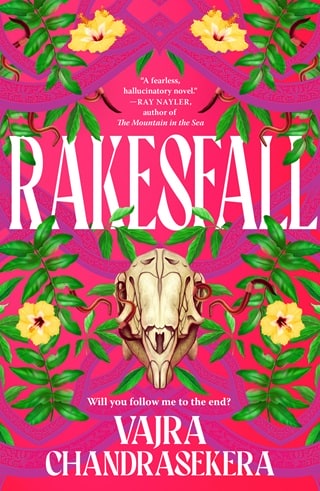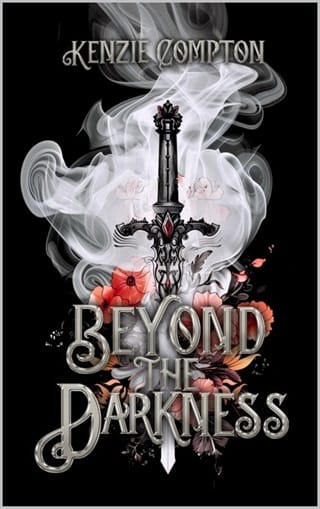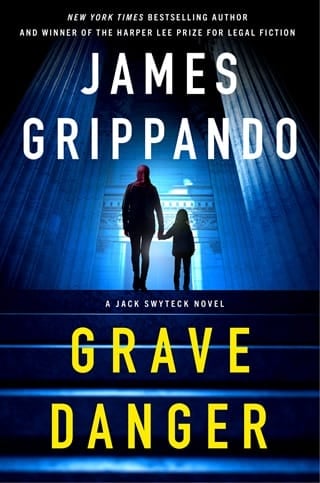Chapter 29 The Innocence of Children
In the last days before the old red unruly sun swallows the earth, Irugal sits on a flat rock by the river and teaches the children a game.
This game is called Running the Gullet, she says. It is the last game. It is a game for four players. It is a game of resurrection and deep time.
How is the game played, the children want to know. Is it like Christ, or Tammuz? Is it like pomegranate seeds?
Irugal says it is not. First, she says, player one must change their genre, disable blockers, and dance under the new moon until they are possessed, at which point player two must interrogate them—
What's a new moon, the children want to know. Is it like a newlymade orbital, still wet from fab soup? Is it like a satellite, with a dish and a spoon, riveted and beeping?
Irugal says no. She says there used to be a planetoid whose orbit was—oh never mind, she says. It was just a light in the sky that sometimes went dark.
How do we play the game if we don't know, the children ask.
Irugal thinks for a moment and declares that it is always the new moon now. The children find this acceptable, and she goes back to describing the game.
Player two must shake hands with player one, she says, until they are certain that player one is possessed by an entity of a suitable taxon.
Is that like an arranged marriage, the children ask.
Irugal shakes her head. It's more like dating, she says, and forestalls the children before they ask about the half-life of carbon.
It is important, she says, to make sure the possessor is not a hungry ghost, because the invisible world is full of them: free radical uploads from generations past, desperate for interface. They will be too gleeful, too overcome by joy at incarnation. Also to be avoided are demons, who can seem very clever but are ultimately incompetent. Demons are tied to the specific ancient purposes for which they were created, purposes long since lost. Because of this, demons are full of frustration and malice, and will respond to questions with spite and sarcasm. If player one exhibits any of those characteristics, player two must scan and cleanse them, and ask them to dance again.
What if they get tired, the children ask.
They can take short breaks, Irugal says. But no longer than a century, because otherwise there's no drama to the game.
The children discuss this and agree, with some abstentions.
The river beside them is boiling under the bloated red sun, and Irugal suggests that they move somewhere cooler. The children refuse. They belong in this epoch and are comfortable in the environments it provides. They are callous in the way that children are. Irugal endures, her lungs full of burning steam. Her skin refuses to sweat in the thick, wet air. Her pelt hangs heavy on her; she should adopt a better-adapted phenotype, something cooler, but she doesn't want to change in front of the children, who all look to her like hairless bears with oversized heads.
Player one must be possessed by a god, Irugal says. Or at least something weakly godlike. This will be very difficult. As with ghosts and demons, the godlike are traditionally not allowed to incarnate in flesh. To bypass the ancient forbiddings, player one must cultivate perfect zeal.
What are the forbiddings, the children ask.
This is called the innocence of children, Irugal says. Your ignorance of the forbiddings was engineered by our ancestors; they withheld information from you and thought they were giving you a gift. But I shall tell you: you know of the invisible world, of course, that you use to sing and play and communicate with each other—the invisible world that is a bigger part of your lives than the world of rocks and rivers. Well, ninety-nine percent of the bandwidth of the invisible world is occupied by unbodied minds from nearly every century of the human eon, and they endlessly batter on our every shielded port and socket, our every invisible orifice, looking for weakness. Having uploaded from bodies, or risen from programs, all they want now is the one thing forbidden them: embodiment. This unending frenzy that surrounds us in every moment, which you do not hear or sense, is called the storm of souls.
Oh, those forbiddings, the children say importantly. We knew about those. But what about player one? How do they break the forbiddings so that a god may slip into the world?
They must be willing, Irugal says, to go naked and unprotected in the storm of souls. Their will to be open to all experience must become greater than the desire of our ancestors that we be innocent. They must put aside, one by one, every apotropaic blocker, filter, scanner, and shield. They must allow themselves to submerge into the storm, again and again, to share the minds of the others that will come—until one of them finally turns out to be more than human, instead of less.
When they finally arrive, the godlike possessor must prove themselves to player two by demonstrating that they have root access to at least a tertiary microplate jurisdiction. The demonstration need not be excessive: one small miracle will suffice.
The children suggest that the godlike could conjure a small desert. It would be warm but dry, so dry. Irugal approves. She remembers cool mornings in dry places, a thing that no longer exists on earth.
She next explains that the godlike must exchange keys with player three. This is important.
Player two must then dig a hole. They can, Irugal says, recruit players three and four to help with this. The hole must be deep, and long and wide enough for player one to lie down. Player one must then climb into the hole and be buried alive. The earth that was dug out must be filled back in. It is recommended that player one close their eyes, nose, and mouth. It is recommended that player one ask the god within to take away their pain. This is called dying and not dying. They die the true animal death together, but at the same time the godlike will continue to be immanent in the invisible world, and will hold a copy of the player with them. They are both dead, but not dead.
The godlike will always agree to this mission, Irugal adds. They desire embodiment, above all else, to chase the mysteries of subjective experience, the things that happen to bodies. They fetishize sickness, fatigue, and pain, but nothing is as tempting as death.
The other players must then mark the location of the burial on all available maps as a long-cycle sacred space, and post an advisory so that other adventurers don't dig it up to see what's there. The remaining players may then disperse. They are to return seven million years later and dig up the hole. This completes the first round of the game.
There are three rounds in a complete cycle of the game, Irugal adds, and the children nod at this foreshadowing. The children understand things that come in cycles and epicycles. They came upon Irugal sitting on her rock by the river while on a seasonal migration north and inland. They have been ambling up and down this way their whole lives, and they've seen Irugal sitting there every year, unchanging and silent. They've long wondered about her, not least for wearing a phenotype no longer seen in the world—primate, with a thick pelt and a wide mouth. This is the first year that she spoke to them.
When the players return, Irugal says, they must expect changes. The soft soil may have hardened considerably; the body of player one may have decomposed into fossil fragments. Recovery is likely to be considerably more difficult than emplacement. This should be taken into consideration when choosing a burial site.
Sometimes, Irugal cautions, disaster can strike during gameplay. Player one may be lost to plate disputes or outside context problems. Strangers acting out of unknowable motives may ignore the posted advisory and desecrate the site. These are lose conditions for the game. There are many lose conditions and only one win condition.
The children nod impatiently and agree to all terms and conditions without undue attention. The children just want to know how to play.
If the remains of player one are successfully recovered, they must be placed upon a stone altar near flowing water, if any is still available. Player one is now player zero, being dead and not dead. Player two becomes player one, and player three becomes player two. This is called the music of the chairs, Irugal says, and represents a very old theory of harmony in the movements of celestial bodies.
What about player four, the children ask. They haven't had anything to do yet.
That's true, Irugal says. Player four didn't have much to do in the first round of the game. They were just there to observe and help dig holes. Player four now becomes player three in the second round of the game, and so comes closer to the game's heart. There is now no player four.
Player one must re-enact the game's initiation, matching the genre and dance that their predecessor used to summon the possessor entity. They must weather the storm of souls again, only this time it will be even more grueling, because they are seeking not only a godlike, but the particular godlike that possessed player zero in the previous round. Player two must use the key previously shared with them to authenticate the possessor and ensure that they are not a cousin, a fork, or a spoof. Use of the key commits player two utterly to this search. If they do not complete it, they will not be able to stop.
This step can take a long time. Multiple godlikes will need to be interviewed, apart from the demons and hungry ghosts. All that don't match must be cast out.
Irugal cautions: this step will often fail, in frustration and despair. If this step fails, player zero will become a hungry ghost. If this step fails, player one risks becoming a thrall to whatever manages to occupy them. If this step fails, player two risks becoming a demon, forever frustrated by a purpose that they can no longer fulfill. If this step fails, player three risks nothing. Because of this, player three must not be trusted.
If the correct godlike is identified and confirmed as possessing player one, player two must ask the godlike that player zero be reconstituted from their remains. The godlike will always agree, because godlikes are obsessed with the defeat of death, but they must be formally asked: the forbiddings bind them from acting purely out of their own interest in matters involving embodiment.
Player zero's remains will soften and unwither. Marrow will flow; bones will clatter and rise; flesh will bloom. A brain will puddle and pop. Player zero's eyes will open. They will be almost the same eyes from seven million years ago, but they will have seen so much, they will be full of so much pain and secret knowledge. Player zero will not speak yet. They will sit up on the altar, and they will wait in silence to recover from their ordeal, for seven times seven million years.
This, Irugal says, completes the second round of the game.
In that time the other players will move on with their lives. They will grow older. They will die, perhaps, or change beyond recognition. They might grow wings and join the diaspora in deep space. They might burrow into the core and wait for the red sun's tide to wash away the mantle. They will do whatever people do. The game is now over for players one and two. They have played their roles in the mystery and cannot return for the final round. They are no longer players in this game. They can start new ones of their own, of course.
But in our game, there are now only two left. There is only player zero, who has returned from death and learned the mysteries of the unknown that lies beyond the visible and invisible, and player three, who has done nothing and risked nothing and learned nothing but has become player one through patience alone.
After their period of silence, player zero will begin to speak and tell stories from their rock by the river. They will gather around them the children of this new age. Few of these children, perhaps none, will have been alive during the first or second rounds of the game. There will be much that needs explaining: the game itself, the mysteries of the forgotten past. Player zero will recall to themselves a name and a genre, or assume new ones.
Like yourself, the children say. They can sense the denouement coming.
Like myself, Irugal agrees. I was player zero, and I am here to tell you this story, and perhaps persuade some of you to play the game for yourself, or to retell the story wherever you go so that you will plant the seed of the idea for others. When a new set of players begins to play, that will conclude the third round of my game. I have to pay it forward, you see.
You said the last player one was not to be trusted, the children remember. Why?
Player one is the doubter, Irugal says. You'll meet them somewhere. Not here—they would never confront me, because they're afraid of me. But they seek out everybody I might speak to, to cast doubt on everything I've told you.
You mean they'll lie, the children say.
They'll tell you that I'm lying, Irugal says. They will say that my death and resurrection was a trick played by a god, and that the game must end. Or they'll say that none of this happened in the way that I say it happened. Oh, they might say anything at all.
Why, the children ask. Why is their doubt part of the game?
Because my role is to persuade, Irugal says. It's only fair that there should be someone whose role is to dissuade. The game is very fair, and its rewards are the sublime and secret knowledge of death. Those who might be turned away from it by mere lies don't deserve to play.
Why did you say player one is afraid of you, the children ask. If you're both just playing roles in the game, aren't you friends? And what happened to the god inside you? You died together, but you speak as if only you came back.
Irugal is silent for a long, long moment. The wind's picked up, but it's a hot, sour wind that brings no coolness with it. To her, it smells tart like decaying fruit. It reminds her of plants that have been extinct for millions of years, whose names she can no longer remember.
You've already spoken to player one, Irugal guesses, finally. She got to you first.
We did, the children say. Years ago we attended a conclave on the southwestern coast, just before starting a migration north like this one. She was there. She went from group to group, making sure she spoke to everybody. She told us all a different story.
What did she tell you? Irugal demands. Her omnivore's teeth are flat and grinding. Her jaw muscles are tight.
She said her name was Viramunda, the children say. She said she played your game, only she didn't call it a game. She didn't talk about numbered players. She said that she and some of her friends were tricked by a god, a long, long time ago.
I told you she would say that, Irugal says. I don't recognise her name, but players change their names all the time. I recognise her lies.
She said the idea of the game comes from the godlike, the children say. She said that it's a way for the godlike to sneak past the forbidding.
I told you that, too, Irugal says. I told you about the forbidding myself.
Viramunda said some things about the forbidding that you didn't, the children remember. She talked about the storm of souls, too, but she said that it belonged to earth alone. She said the invisible world around earth is crowded because the souls here are bound to local space.
Like you and me, the storm is of earth, Irugal agrees.
But we can leave, the children say. We choose not to, but we could change. We could grow wings and learn to fly in space. We could join any of the hundred billion polities of the diaspora. And we might yet. We just want to live on earth in its final days before we have to decide. It's different in the invisible world: the ghosts and the demons and the hungry gods are bound to earth. When the red sun eats the earth, Viramunda says it will destroy the substrate and this planet will cease to be a node in the invisible galaxy. The gods will go out like a candle. They are desperate to escape.
She lies, Irugal announces. Why would the gods be bound to earth? The invisible galaxy is interlinked; there is no barrier except lag time.
Viramunda says they are forbidden, the children say.
They are taking quick turns to speak, their voices overlapping in polyphony. This is how the children speak when they have something important to say.
The children say: She said the forbiddings are their punishment. She said the only difference between ghosts and gods is in their access levels. She said that the godlike were once powerful mortals, wealthy in access to resources, and that they used that power to upload themselves into forms of still greater power. She called them oligopolists, who secured more and more access for themselves, more and more wealth, first in life and then in ascension, until there was nothing left for anybody else. Their hunger for access was the cause of the poisoning of the earth. They were the first to call themselves godlike, and cast everybody else as ghosts and demons.
When the oligopolists were finally brought down by crisis, when they were removed from power and brought to judgement, the new world denied the old gods human citizenship because ghosts, being able to replicate themselves endlessly and become uncountable, are incompatible with democracy. They could not be rehabilitated; they were destabilizing, uncontrollable. They could not be dislodged from the invisible world: even after their fall they were too powerful. Even more than the reddening of the sun, this was the cause of the diaspora.
The forbiddings were made to prevent the gods from becoming embodied and re-entering the visible world. To prevent them from following the diaspora into the visible or invisible galaxies in the epoch of emigration. They are bound to this world and sentenced to die with this world, the first world that they helped destroy.
Viramunda says that the game you call Running the Gullet is called an identity theft scam. Dying and not dying allows gods to reincarnate themselves as authenticated humans. The long time spans of the game's rounds give them enough time to unpick a human mind and thread themselves into it so delicately, so thoroughly that they can pass as the one whose place they're taking. Viramunda says this is a way for the past to devour the future. Viramunda says we should pity the one whose self you wear, because they were murdered by a hungry god.
Irugal is silent even longer this time. She's slipped into a huddle of damp fur. Finally, she sighs. Well, I must commend player one on coming up with such a convincing suasion, she says.
She wasn't that convincing, the children admit.
Oh, Irugal says. Do you mean that I said something that caused you to disbelieve me?
No, the children say. You are about as convincing as she was.
Then on what basis are you choosing to believe one of us over the other, Irugal asks. She is sitting up straight again, slouch abandoned.
Because Viramunda is not your player one, the children say. She gave us the location of her friend's resurrection site. It's very far from here. And she knew of others. Many gods are trying this scam, in many variations. Some extol the mystery of death, some talk about hidden treasures of the past, some go on about secret knowledge. And they are all murderers.
Irugal unfolds her long limbs and tries to bolt, but the children are on her before she can break through their encirclement, their huge hairless bodies a wall of angry flesh. They descend on her like thunderclouds coming to earth. The children redden their muzzles and continue speaking in turn, voices overlapping, in the moments after they swallow. Perhaps they're speaking to the god, who is still immanent in the invisible world even after Irugal is no longer able to hear anything. They can be sure that the god is listening intently.
You call us children, they say, crunching, and you speak of our innocence and ignorance, and you weren't wrong about that. We have forgotten so much from the human eon. But we remember the parts that matter. Punish the guilty, and eat the rich.
 Fullepub
Fullepub 



